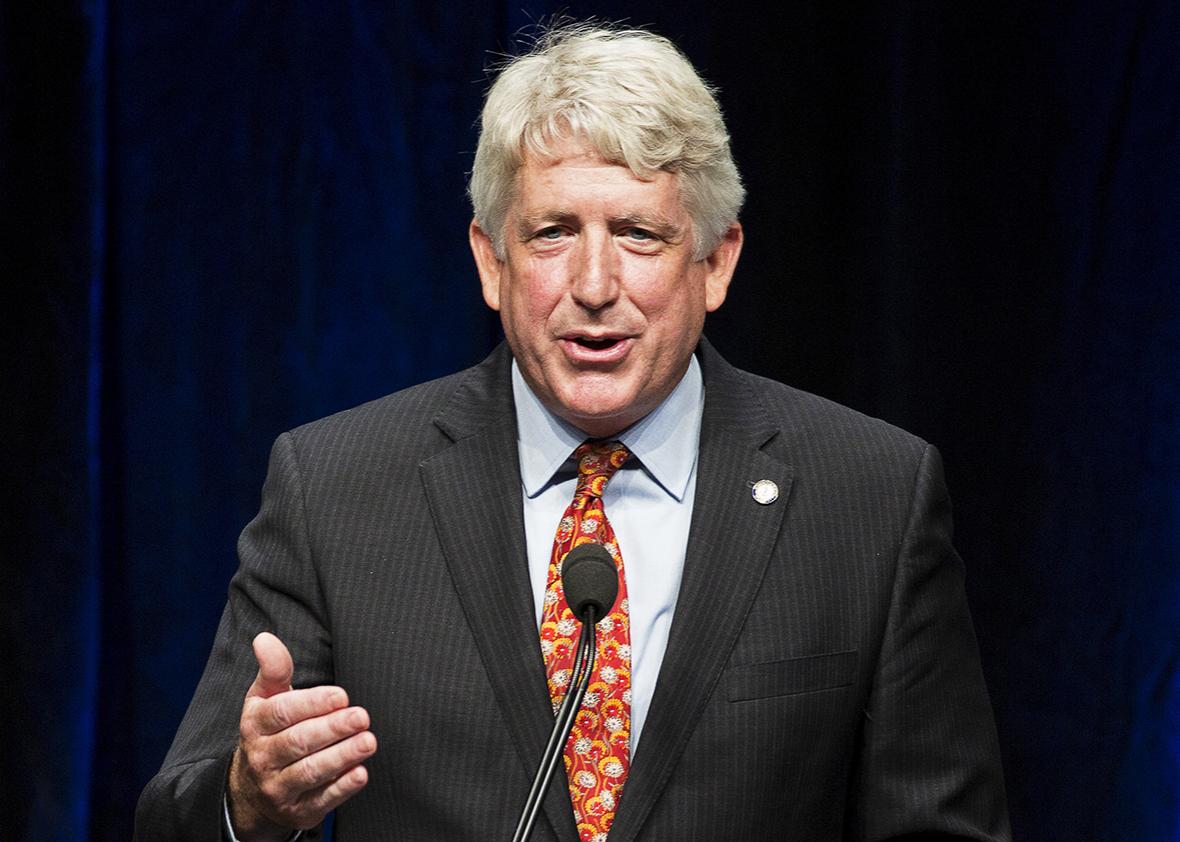Shortly after Donald Trump issued his immigration ban, a handful of states raced to court, urging the federal judiciary to declare the executive order unconstitutional and block its implementation. Most of these lawsuits emerged from reliably liberal states like Washington. Yet perhaps the sharpest state challenge to Trump’s ban was penned by the office of Virginia Attorney General Mark Herring. Although Virginia is undoubtedly a swing state, Herring’s tenure has been marked by progressive achievements; his office declined to defend the commonwealth’s same-sex marriage ban and rolled back draconian restrictions on abortion clinics. Now Herring has brought Virginia into the battle against Trump’s order, filing a remarkable brief that connects the travel ban to segregation and accuses it of unlawfully targeting Muslims.
On Wednesday, I spoke with Herring about his brief, the ban, and his office’s sometimes troubling history. The conversation has been edited and condensed for clarity.
Mark Joseph Stern: Why did you decide to get Virginia involved in this lawsuit?
Mark Herring: The attorney general represents the government, but he also represents the people. And this executive order hurt so many people in Virginia: University students trying to return to school after visiting their families. Professors afraid to attend academic conferences overseas. Immigrants and their families. And, of course, the Muslim community, which the order clearly targeted. I thought it was important that we go to court to defend their rights.
I’m also keenly aware that the Virginia attorney general’s office has not always stood on the side of justice. I thought this was a moment when we could really do the right thing.
Can you elaborate on that?
In the 1950s, Virginia defended school segregation; Brown v. Board of Education was actually comprised of five cases, and one of them arose in Virginia’s Prince Edward County. In the 1960s, Virginia defended its interracial-marriage ban all the way to the Supreme Court—where, thankfully, it lost. Then in the 1990s, Virginia argued unsuccessfully against gender equality in higher education at the Supreme Court in the VMI case. Those cases cast a long shadow.
This time around, I felt we should stand on the right side of the law and the right side of history. I don’t want to have those injustices repeated. Similarly, when Virginia’s same-sex marriage ban was challenged, I decided not to defend the ban. I agreed with the challengers that it violated the 14th Amendment to the United States Constitution.
You certainly backed the right horse there.
[Laughter] Our position was ultimately vindicated in court. And I was thrilled. The ban injured so many families, denying them basic rights and equal dignity. It was very gratifying to see the courts agree that it violated their constitutional rights.
Your challenge to Trump’s executive order is quite conscious of history. Why did you decide to reference Plessy v. Ferguson and invoke Justice Harlan’s famous dissent?
I think it’s important for the court to call this ban out for what it is. In Plessy, a majority of the Supreme Court accepted the claim that segregation wasn’t designed to discriminate against African Americans. But Harlan didn’t accept that pretext. He recognized that when the government discriminates against individuals on some forbidden basis, it very rarely declares its intentions. That insight remains important today. The executive order may not announce its discriminatory purpose. But if we look at everything the president has said about it, and its actual effect, it becomes obvious that the order discriminates unlawfully.
Your complaint makes that point vividly. Quoting Harlan, it states that “the seeds of hate towards Muslims are ‘planted under the sanction’ of the Executive Order.”
We believe the travel ban isn’t just unconstitutional; it’s un-American. This country is a melting pot. It always has been. America was built by immigrants. This executive order is an attack on Muslims, but it’s also an attack on immigration. That goes against core American values.
Last week, I went to Dulles to greet Najwa Elyazgi, a senior at George Mason here in Virginia. She has a student visa, perfectly lawful, and was overseas when the president signed the travel ban. Because of his order, she was barred from flying back to the U.S. for a week. She was only able to return after a judge blocked the ban.
Najwa is a terrific student and a brilliant young woman. She didn’t break any laws. Why is the president trying to exclude her from the country? What message does that send? I’ve heard from other foreign students here in Virginia who previously planned to continue their education in the commonwealth. Now they’re looking elsewhere, at Canada or Europe, because they’re afraid, and understandably so.
Your complaint makes that point, too: The travel ban harms public universities, which harms the state itself.
Exactly. And that harm isn’t speculative. We’re already seeing it happen. We have students and faculty who have been cut off from the international academic community and prospective students who may now decide not to come to Virginia. That’s a real shame.
Has there been much backlash to your decision to challenge the ban?
The reaction has been overwhelmingly positive. During the hearing last Friday, Judge [Leonie] Brinkema [of the U.S. District Court for the Eastern District of Virginia] said that she’d never seen as much public outpouring as she had in this case—that the executive order “touched something in the U.S. I’ve never seen before.” That rings very true to me. Virginians by and large recognize that this order is discriminatory and unjust. It hurts the commonwealth and its people. It’s unconstitutional. And we look forward to proving that in court as this case moves forward.
